

Year 3 UOI 3 How we express ourselves .pdf. Who we are: Country/Place - Reconciliation Australia. Australians Together. Indigenous Australians: Aboriginal and Torres Strait Islander people. It’s best to find out what individuals prefer to be called, rather than making assumptions.
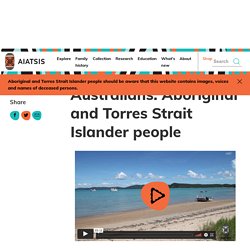
Today, the term ‘Indigenous Australian’ is used to encompass both Aboriginal people and Torres Strait Islander people. However many Aboriginal and Torres Strait Islander people do not like to be referred to as ‘Indigenous’ as the term is considered too generic. When used in Australia, the words Indigenous, Aboriginal and Torres Strait Islander are capitalised, as would be the name of any other group of people. It is best not to resort to the acronyms of ATSI or TSI. Aboriginal people have referred to themselves for example as Koori, Murri or Nunga, which is relevant to the greater region they are connected to. Living languages. The Inuit Part 1. The Inuit Part 2. Inuit - Introduction, Location, Language, Folklore, Religion, Major holidays, Rites of passage.
PRONUNCIATION: INN-oo-eht ALTERNATE NAMES: Eskimo LOCATION: Canada (Greenland); United States (Alaska); Aleutian Islands; Russia (Siberia) LANGUAGE: Inuit.
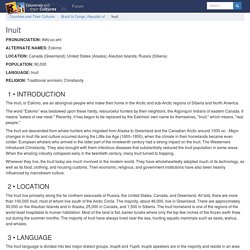
Inuit - Britannica Kids. The Inuit are native people of the Arctic and subarctic regions of Greenland, Canada, the United States, and far eastern Russia (Siberia).
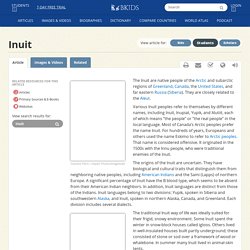
They are closely related to the Aleut. Various Inuit peoples refer to themselves by different names, including Inuit, Inupiat, Yupik, and Alutiit, each of which means “the people” or “the real people” in the local language. The Argentine Gaucho. New Zealand: Maori - Travel Kids in Oceania. Maori - Britannica Kids. The Māori were the first people to live on the islands of New Zealand.
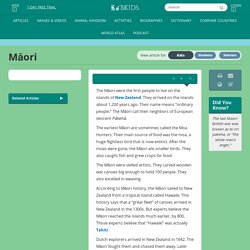
They arrived on the islands about 1,200 years ago. Their name means “ordinary people.” Maori Culture New Zealand, Maori Culture, Traditions and Tourism. Today Māori people live throughout New Zealand, and many are actively involved with keeping their culture and language alive.
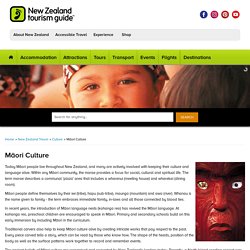
Within any Māori community, the marae provides a focus for social, cultural and spiritual life. The term marae describes a communal 'plaza' area that includes a wharenui (meeting house) and wharekai (dining room). Māori people define themselves by their iwi (tribe), hapu (sub-tribe), maunga (mountain) and awa (river). Rare look into Kazakh Nomads' epic migration. Kazakh Culture. Beliefs, Lifestyle, Arts and Interesting Facts about Culture in Kazakhstan. The Kazakh people are rich in traditions.
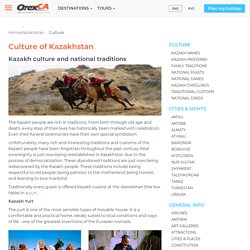
From birth through old age and death, every step of their lives has historically been marked with celebration. Even their funeral ceremonies have their own special symbolism. Unfortunately, many rich and interesting traditions and customs of the Kazakh people have been forgotten throughout the past century. Real sovereignty is just now being reestablished in Kazakhstan due to the process of democratization. The Sound of the Chukchi language (Numbers, Greetings & The Parable) Chukchi people - Academic Kids. From Academic Kids Chukchi, or Chukchee (Russian: чукчи (plural), chukcha, чукча (singular)) are an indigenous people inhabiting the northeasternmost portion of the Russian Federation on the shores of the Arctic Ocean and Bering Sea.
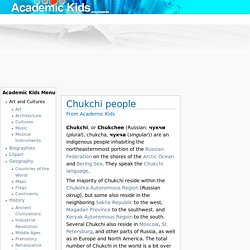
They speak the Chukchi language. The majority of Chukchi reside within the Chukotka Autonomous Region (Russian okrug), but some also reside in the neighboring Sakha Republic to the west, Magadan Province to the southwest, and Koryak Autonomous Region to the south. Facts and Details. The Chukchi are a people who have traditionally herded reindeer on the tundra and lived in coastal settlements on the Bering Sea and other coastal polar areas.
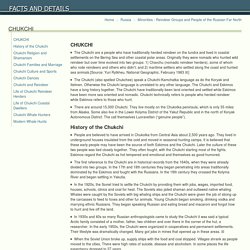
Originally they were nomads who hunted wild reindeer but over time evolved into two groups: 1) Chavchu (nomadic reindeer herders), some of whom who rode reindeers and others who didn’t; and 2) maritime settlers who settled along the coast and hunted sea animals. [Source: Yuri Rytkheu, National Geographic, February 1983 ☒] The Chukchi (also spelled Chukchee) speak a Chukchi-Kamchatka language as do the Koryak and Itelmen. Otherwise the Chukchi language is unrelated to any other language.
The Chukchi and Eskimos have a long history together. The Last Nomadic Reindeer Herders in the World. The Tsaatan Are a Nomadic Tribe in Mongolia.